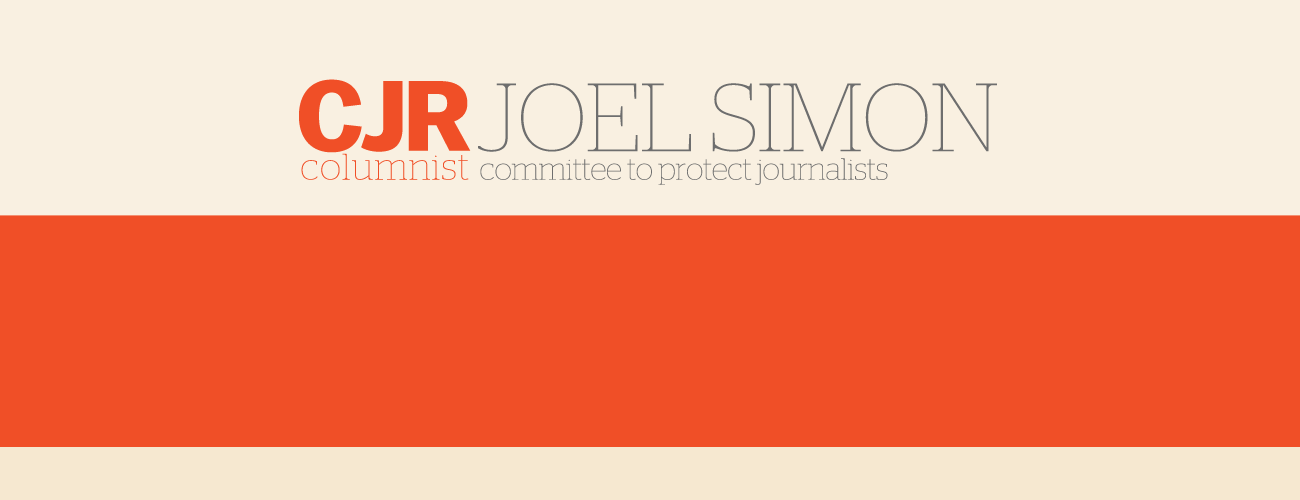Sign up for the daily CJR newsletter.
In 20 years of fighting for press freedom, I’ve come across some pretty awful media laws. My all-time favorite might be Article 72 of the Cuban Criminal Code, often called the law of social dangerousness. Under its provisions, Cuban authorities can detain someone for up for four years based on a belief that he or she is likely to commit a crime in the future. The law has been used repeatedly to jail critical reporters. Police can even issue a warning, alerting a suspect that he or she is in danger of becoming dangerous.
Another doozie comes courtesy of Iran and is called moharebeh, generally translated as “waging war with god.” This law has been used to jail journalists, writers, and poets who question the principles underlying the Islamic revolution. Shiva Nazar Ahari, founder of the Committee for Human Rights Reporters in Iran, was convicted of moharebeh in 2010. The offense carries the death penalty, but Ahari was sentenced to 76 lashes, which was later converted to a fine.
With laws like these on the books, competition for the world’s worst media law is pretty stiff. But during a recent visit to Myanmar, I discovered a new contender for this dubious honor. It’s Article 66(d) of the country’s Telecommunications Law. The single most appalling feature of the law is that anyone can file charges against anyone else for publishing something they don’t like online. Since in all media is now online, journalists are prime targets. Ever made a nasty comment on Facebook? You could be charged in Myanmar.
In practice, what the law means is powerful people and institutions in Myanmar can easily silence their critics. Scores have been charged in recent years, including at least 17 journalists, one of whom remains behind bars. The law allows imprisonment for up to three years. It’s considered a non-bailable offense, meaning that those accused can immediately be hauled off to jail.
What makes Article 66(d) so terrible is not just its sweeping and arbitrary application, but what it represents for Myanmar, a country that is making an uneasy transition from military rule. Under the generals who ran the country for more than four decades, Myanmar—or Burma—was one of the most censored countries on earth. The Telecommunication Law was put in place in 2013, two years before the Parliamentary election that brought to power the National League for Democracy led by Nobel Laureate Aung San Suu Kyi.
This government is different, but there is still an invisible line. Sometimes you try to test it and feel it, because you can’t see it. But if you cross the line, you are finished.”
Suu Kyi, who assumed the title of State Counsellor last year, promised to inaugurate a new era of press freedom. But the fact that Article 66(d) remains on the books seriously undermines her efforts. I saw this plainly when I visited Myanmar earlier this month as part of a CPJ delegation. A week before our arrival, two journalists from The Voice, a Burmese language newspaper and website, were jailed under 66(d) based on a complaint lodged by the military. Angry journalists organized an impromptu Protection Committee for Myanmar Journalists, risking arrest by marching on the courthouse and wearing armbands featuring newsprint-covered hands in handcuffs.
Government representatives in Naypyidaw—Myanmar’s military-designed designed capital city, which looks like an abandoned theme park—acknowledge the law should be amended, but say its full repeal is not on the table. Myo Myint Maung, the permanent secretary in Myanmar’s Information Ministry, said that a bill to remove criminal charges and permit bail was being drafted and that “it won’t take too long.” Our delegation argued that the law should be scrapped, along with the many other statutes that undermine independent journalism.
In Yangon, we visited The Irrawaddy, a critical newspaper and website that operated from exile during the military dictatorship. Today, it occupies a ramshackle office downtown. Kyaw Zwa Moe, editor of The Irrawaddy’s English-language edition, told us the paper maintains an office across the border in Thailand and operates under a policy of “one foot in, one foot out.”
“The previous government was an enemy of the press,” Moe explains. “This government is different, but there is still an invisible line. Sometimes you try to test it and feel it, because you can’t see it. But if you cross the line, you are finished.”
Three provincial journalists made this unfortunate discovery recently. Tin Shwe, Zar Zar San, and Phyupwint Nayche posted on Facebook that villagers in Myanmar’s Magwe region were angered by the bulldozing of trees in connection with the construction of new road. While they have so far avoided jail, they face charges under Article 66(d) for posting “incorrect information.” The three are the latest victims of a terrible law that is stifling Myanmar’s domestic media and undermining its international reputation.
Has America ever needed a media defender more than now? Help us by joining CJR today.







